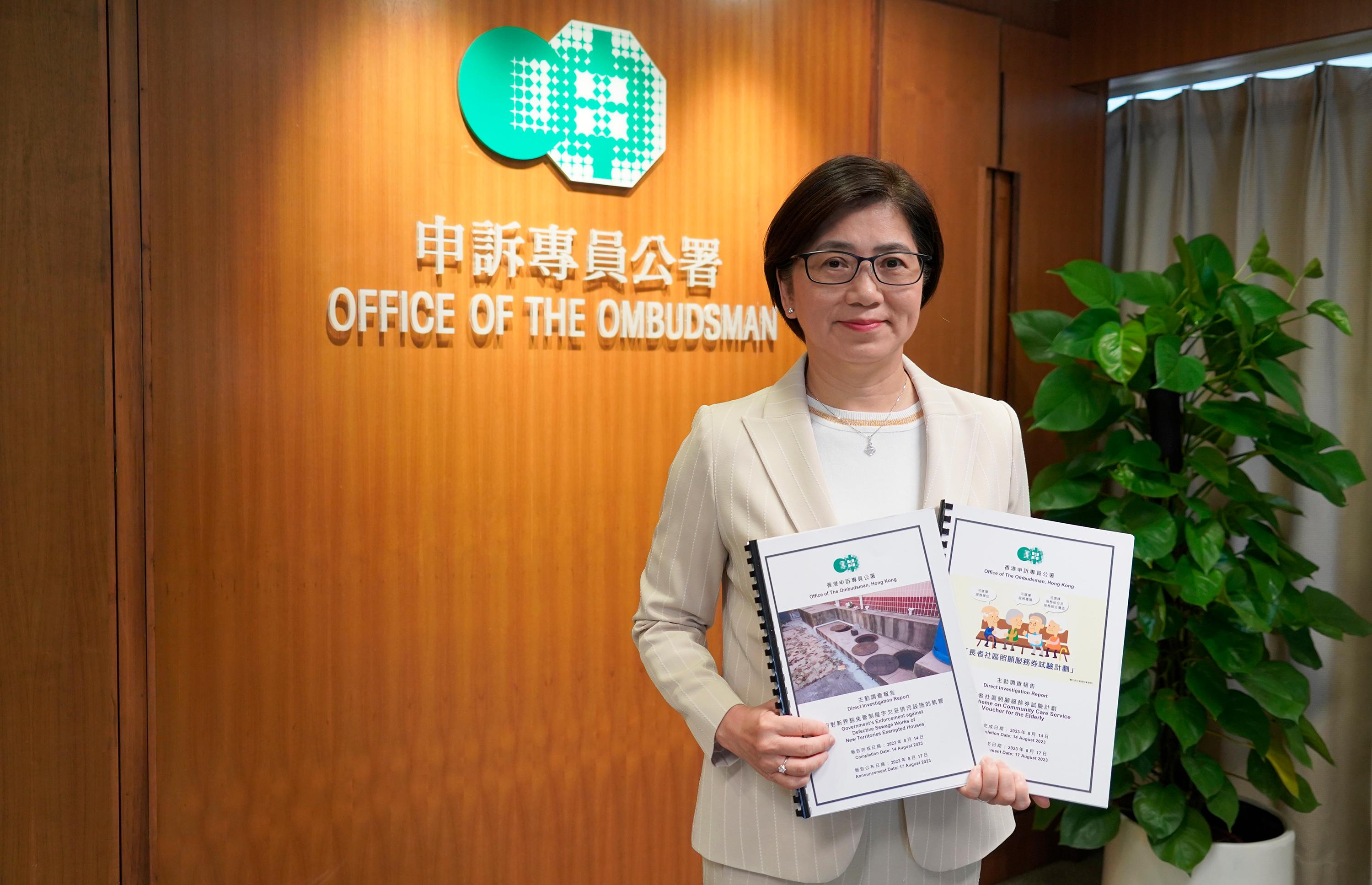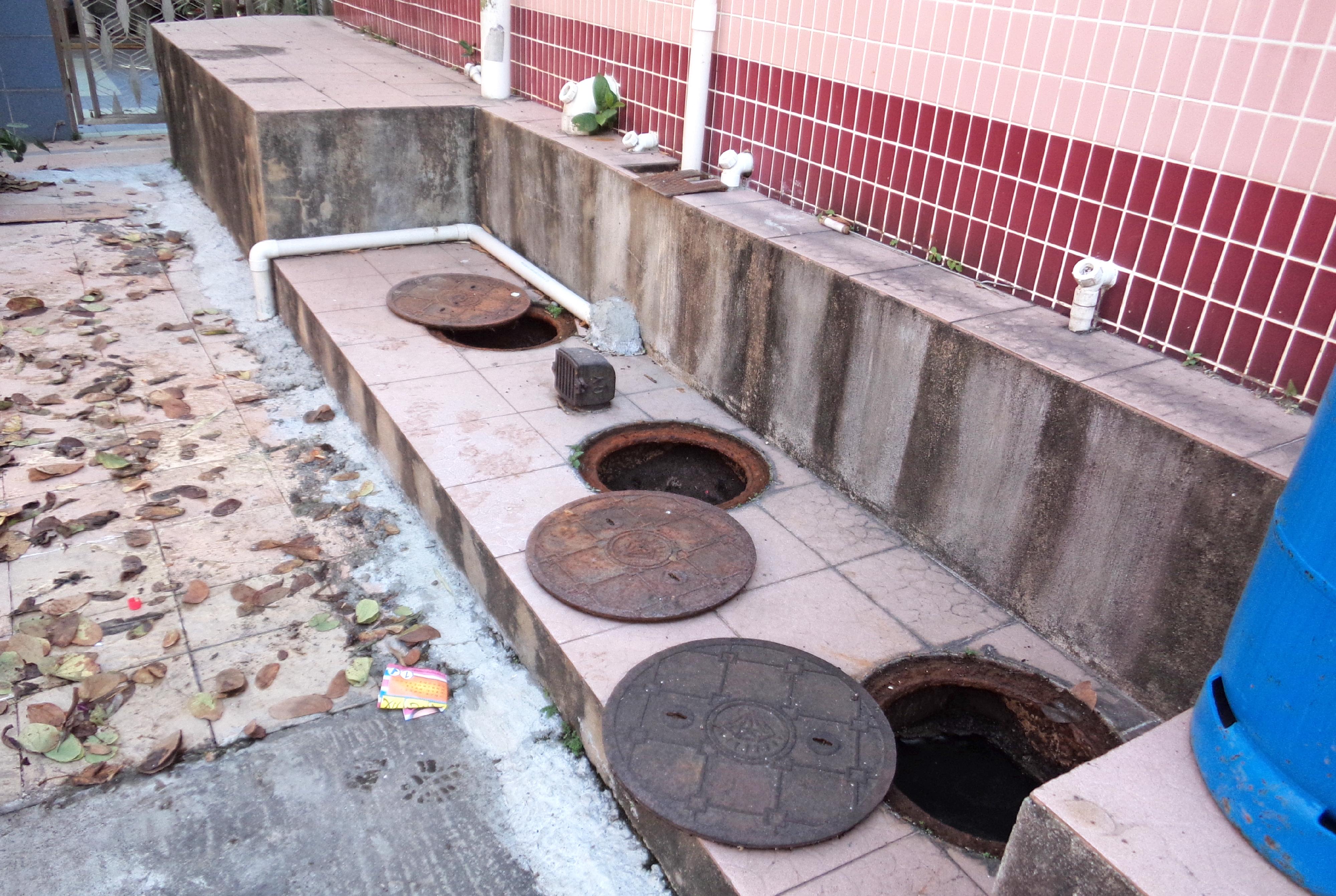The following is issued on behalf of the Office of The Ombudsman:
The Ombudsman, Ms Winnie Chiu, today (August 17) announced at a press conference the completion of a direct investigation into the Government's enforcement against defective sewage works of New Territories Exempted Houses (NTEHs) and made 10 recommendations for improvement to the Environmental Protection Department (EPD), the Food and Environmental Hygiene Department (FEHD) and the Lands Department (LandsD).
NTEHs built in accordance with the Buildings Ordinance (Application to the New Territories) Ordinance are generally exempted from certain provisions of the Buildings Ordinance. Certificates of exemption, in respect of drainage works among other items, must be obtained from the Director of Lands before NTEHs are built. The certificate of exemption in respect of drainage works stipulates that the works should comply with the Drainage and Health Requirements for Village Type Houses. In rural areas where no public sewers are available, applicants for construction of NTEHs should build sewage disposal systems including septic tanks and soakage pits pursuant to the above requirements.
To address complaints about defective sewage works of NTEHs, the EPD enforces the Water Pollution Control Ordinance from the perspective of identifying any pollution caused to the waters of Hong Kong or sewage discharged into stormwater drains; the FEHD investigates the existence of any nuisance specified in the Public Health and Municipal Services Ordinance; the LandsD takes lease enforcement action, where appropriate, after examining whether the defects are in breach of the sewage provisions in the land leases.
An investigation by the Office of The Ombudsman (the Office) found that the EPD, the FEHD and the LandsD all have constraints in handling complaints about defective sewage works of NTEHs, resulting in their inclination to refer complaints to other departments, but they only have a limited understanding of the constraints faced by the others. As a result, complaints remain unresolved even after repeated shuffling among departments. At present, there are neither established guidelines among the departments on how to pursue this type of complaint under different scenarios, nor a mechanism for information exchange, thereby compromising the enforcement efficiency. Meanwhile, the EPD and the FEHD focus on whether they can enforce their respective legislation and seldom consider joint enforcement actions.
The Office's case studies also revealed that the LandsD merely focuses on referring complaints to the EPD and the FEHD without fully discharging its enforcement role. Moreover, the LandsD has only recorded the total number of complaints received without any breakdown or further statistics, making it difficult to monitor the progress of complaint cases effectively. According to the prevailing land grant provisions and the Drainage and Health Requirements for Village Type Houses, NTEH owners are responsible for proper treatment and disposal of sewage, as well as periodic inspection of sewage works. However, under the prevailing regulatory regime, no substantive measures are in place to ensure NTEH owners' fulfilment of their maintenance responsibility.
Ms Chiu said, "Defective sewage works of NTEHs, such as rupture or leakage of septic tanks, may cause serious environmental pollution and nuisance, and even spread diseases. Although the Government has been constructing village sewerage systems throughout the territory, more than 40 per cent of villages yet to be covered by the village sewerage programme will have to continue to rely on septic tank systems for sewage treatment in the foreseeable future. As the enforcement responsibilities in respect of NTEH sewage works scatter among departments, inter-departmental collaboration is of paramount importance. In light of our findings, the EPD, the FEHD and the LandsD should reinforce collaboration and complement one another, as well as rationalise the responsibilities and procedures for inter-departmental cases. The Office hopes that the three departments can implement our recommendations as soon as possible for more effective control over NTEH sewage works."
The Office's recommendations made to the EPD, the FEHD and the LandsD are:
- Set up an inter-departmental working group to provide a communication platform regarding their respective functions and constraints, with a view to complementing one another and discussing solutions to complicated cases at an early stage to achieve synergy;
- Draw up operational guidelines for frontline staff specifying concrete follow-up and referral actions in typical scenarios of complaints, thereby rationalising the responsibilities and procedures for inter-departmental cases;
- Devise a proper mechanism for information exchange so as to enhance the effectiveness and efficiency of complaint handling;
- For cases of sewage discharged into stormwater drains, the EPD and the FEHD to explore room for enforcement co-operation, such as identifying the circumstances for taking joint actions to enhance the effectiveness;
- The LandsD to formulate a monitoring mechanism for complaint cases, conduct data analysis and proactively assist other departments where necessary; if a breach of land lease provisions is confirmed, take lease enforcement action decisively;
- The LandsD to strengthen the training of District Lands Offices’ staff through experience sharing by the EPD and the FEHD, such that they are well equipped to inspect sewage works upon the completion of NTEHs to prevent possible environmental hygiene problems at root;
- The LandsD to step up publicity and education on the environmental hygiene problems caused by improper alteration of sewage pipes. On one hand, NTEH owners should be reminded to obtain prior permission from relevant departments, where applicable under the prevailing requirements, for any alteration of sewage pipes for monitoring by the departments. On the other hand, even where no prior permission from departments is required, owners should be advised to seek assistance from professionals to ensure proper alterations;
- The LandsD to explore formulating concrete measures to ensure NTEH owners know how to effectively fulfil their responsibility for proper sewage treatment and maintenance of sewage works in order to comply with the requirements of the land lease and the certificate of exemption;
- The EPD to further utilise electronic means and social media, produce promotional videos, etc to raise NTEH owners’ awareness of the importance of the correct use and proper maintenance of septic tanks and related information; and
- The EPD to consider more extensive use of new technology in due course for more effective detection of the seepage source, with a view to enhancing the effectiveness of complaint handling and investigation.
The EPD, the FEHD and the LandsD have accepted all of the recommendations.
The full investigation report is available on the website of the Office of The Ombudsman at www.ombudsman.hk for public viewing.
Follow this news feed: East Asia







